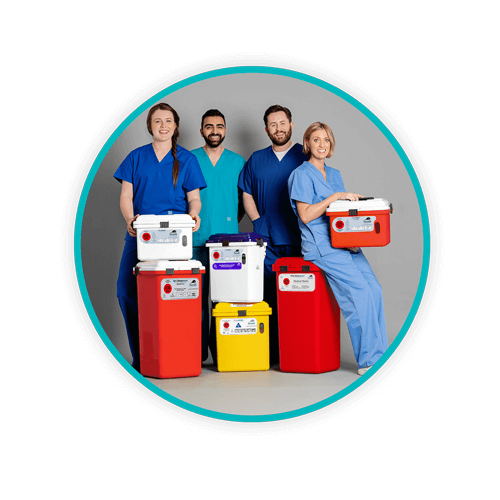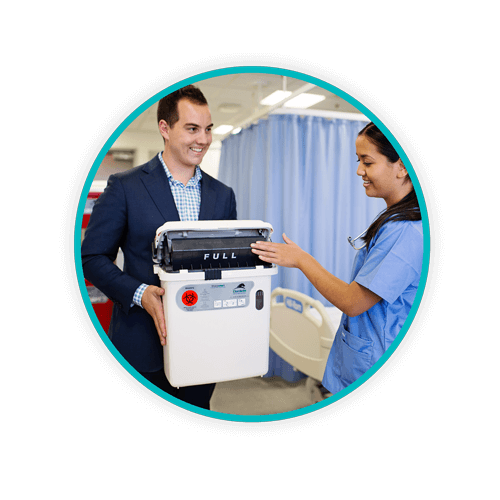Washington Medical Waste Disposal Services
Daniels Health is the leading expert in compliance, clinical containment and environmentally responsible waste management services. Transparent pricing, customized scheduling, immediate cost reduction.
Your brand is worth protecting
Medical waste solutions designed to protect healthcare, meet the highest standard of compliance and drive clinical outcomes.
At Daniels, we protect our customers interests and our own compliance investment by doing everything ourselves – our trucks, our drivers, our clean processing and treatment plants and our permits. We don’t use outside contractors or middle men that could compromise the quality of service and reliability that Daniels is renowned for, or require further steps between medical waste collection and disposal that impose additional costs. Our partnership spans the full service spectrum of safe and responsible healthcare waste management.
Safety Designed Medical Waste Systems
When a cardboard box for medical waste just won’t cut it in a beautiful patient environment!
When we sought out to change the way medical waste was managed in the United States, we started with ‘would we place a cardboard box full of waste in our home environment’. The answer was no, so why would this be acceptable for a patient room? Across all 50 states, Daniels provides the safest, most secure, and most clinically advanced sharps, pharmaceutical and medical waste containers for healthcare facilities, combatting issues commonly associated with medical waste disposal including medications theft from pharmaceutical containers, leaking, needlestick injuries and cross contamination.
Dramatically reduced infection transfer risk
Using a foot-pedal opening mechanism and bagless system means hand contact with the container is no longer required.
This no-touch alternative results in a dramatic reduction in the infection transfer risk that currently exists using standard medical waste containers. The Medismart reusable system ensures that once full, each container is removed from your premises, emptied, and then subjected to a rigorous 6-stage robotic wash and sanitization process that eliminates challenge organisms and proves a 106 Log reduction in bacterial load.
Cradle to Grave Waste Management
Our Drivers, Our Trucks, Our Treatment. Our Responsibility
Unlike other waste management service providers, we protect the process from generation to disposal, assuming full responsibility for the security of your waste. As the waste generator is responsible for waste produced UNTIL such time as it is disposed of, having a medical waste partner that assumes full responsibility of the medical waste pickup, transport, treatment and disposal is critical. To ensure your risk is minimized, it is our drivers, our trucks and our processing facilities that manage your waste – no third parties involved!
How We Serve You
Across 6 countries, Daniels has become a brand name synonymous with healthcare innovation and service
In 38 years Daniels have become experts in delivering solutions for the niche requirements of healthcare. Today over 125,000 services are fulfilled annually across the United States by Daniels owned and operated fleet. From small practices to large medical facilities, our scalable business model ensures that every customer receives:
- Timely scheduled services with clear transparent communication
- Minimum disruption to patient care
- Safety and Security underpinning all biohazardous waste handling practices
- A positive and friendly customer experience
- Cost-effective customized solutions that guarantee efficiencies and maximize savings
Let's Talk!
Your time is valuable, and we don’t want to play hard to get. You can either phone us directly on the details listed on our contact page, or feel free to fill out this short form and one of our team members will get back to you as quickly as possible.


